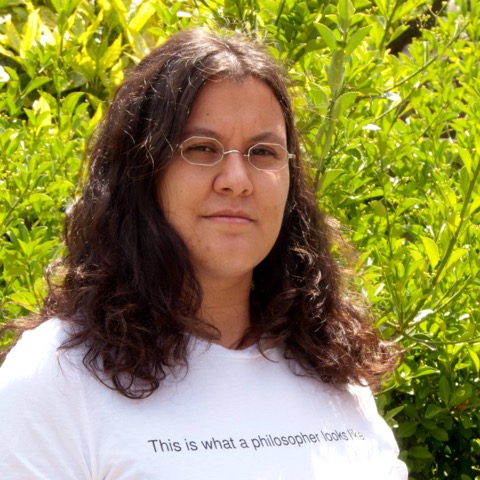Helen De Cruz is a senior lecturer at Oxford Brookes University who works mainly in philosophy of cognitive science, philosophy of religion, and experimental philosophy.
What excites you about philosophy?
I have an earlier Ph.D. in archaeology and an earlier undergraduate degree in world art history and archaeology. I was hoping archaeology and art history would somehow reveal to me what it is to be human, why we love the things we love, and why we aspire to make art, discover the world, and solve difficult mathematical problems. It turns out that art history and archaeology aren’t really about deep questions, but about mundane things like categorizing bits of pottery, whereas philosophy is really the discipline of boundless-blue-sky thinking. I am empirically informed (I’ve done a fair bit of experimental philosophy, and my work is usually informed by cognitive science), but I immensely enjoy that in philosophy no idea or approach is off-limits.
What are you most proud of in your professional life?
I like many of my papers. If I had to pick a recent favorite, it would be the experimental philosophical study on religious disagreement published in Episteme. But looking at my professional life, broadly construed: a year ago, I got a real physical postcard in the mail with the word “Altruism” on the front and a personal thank-you note for my interview series on the NewApps blog—the series was on philosophers outside academia. The note was from a philosopher who was grateful that I did the series; it helped him take steps to work in industry. These interviews got a lot of media attention, for instance in the Atlantic, and even on the Chinese website Paper. My sense is that many philosophers want to try a career outside philosophy but don’t know how. I aim to follow the interviews up with a website with testimonials and a mentorship program (set to launch next year).
What do you like to do outside work?
I’ve got two kids; one is a toddler, the other a preteen. They eat up a lot of my non-work time—especially my youngest. We go to cool places such as museums. I am a fairly okay player of the Renaissance lute and have recently taken up the ukulele. I also like to draw on my iPad.
Where would you go in a time machine?
I’ve debated this once on Facebook, and one thing that emerged was the idea—voiced by minorities—that the past is generally less hospitable to women and to non-white people, so although I like the Italian Renaissance, it would not be a great place to live for someone like me, unless I could somehow take lots of money along and beat the Medicis and Borgias with my conspicuous splendor. On a more serious note, I’ve been intrigued by the Paleolithic era, especially the time in Africa when humans became “culturally modern,” started to wear clothes, make art, etc. (around 100,000 years ago). I would love to see the earliest members of our species in action.
What’s your top tip or advice for APA members reading this?
For job candidates: There’s a lot of pressure on how to maximize our chances in a bleak market, and I worry that people lose their joy in philosophy by trying to publish in fields or on topics they hope will maximize their chances of getting into top journals, that they sacrifice their personal lives to the pursuit of a career. Try not to lose the joy of doing philosophy, try to have some hobbies or interests outside of your work, and maybe try seriously for a backup plan in case your academic pursuits don’t pan out. I’ve talked to people who did their Ph.D.s on Wittgenstein, stoic philosophy, etc., and yet have become successful writers, consultants, or programmers.
*
This section of the APA Blog is designed to get to know our fellow philosophers a little better. We’re including profiles of APA members that spotlight what captures their interest not only inside the office, but also outside of it. We’d love for you to be a part of this, so please contact us via the nomination form here.
Skye C. Cleary PhD MBA is a philosopher and author of How to Be Authentic: Simone de Beauvoir and the Quest for Fulfillment (2022), Existentialism and Romantic Love (2015) and co-editor of How to Live a Good Life (2020). She was a MacDowell Fellow (2021), awarded the 2021 Stanford Calderwood Fellowship, and won a New Philosopher magazine Writers’ Award (2017). She teaches at Columbia University and the City College of New York and is former Editor-in-Chief of the APA Blog.
